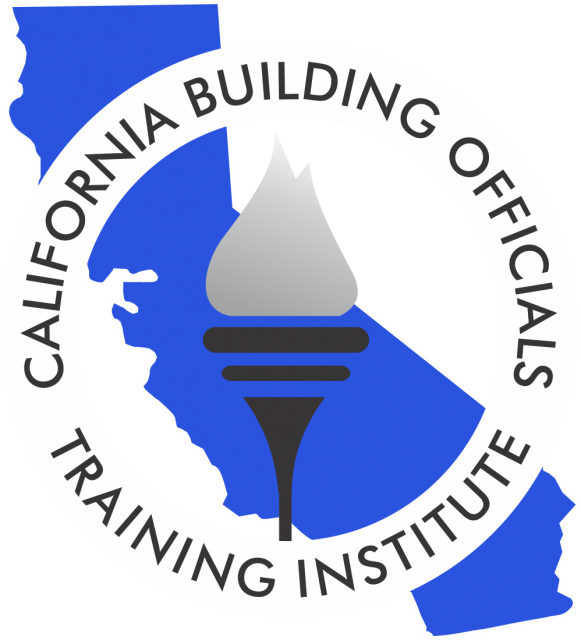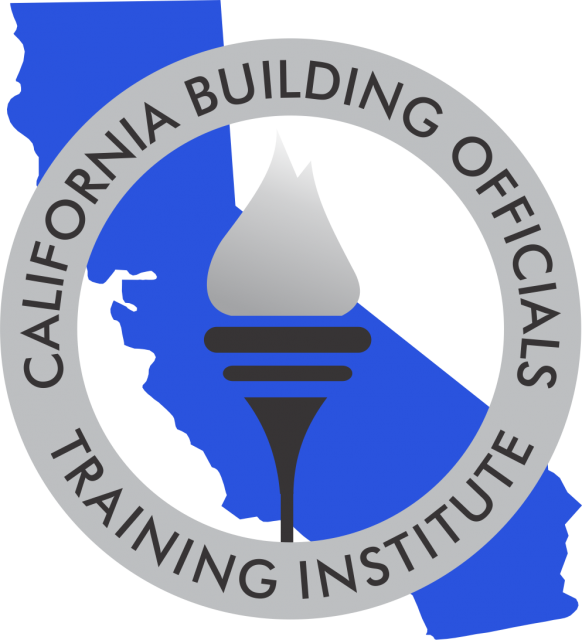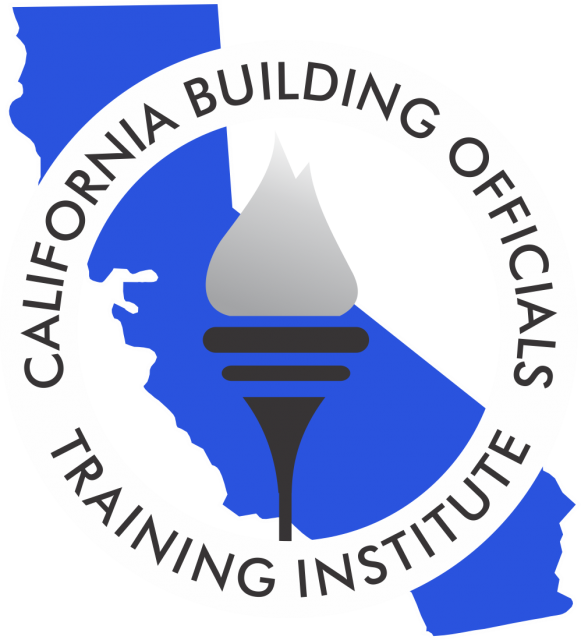Articles, Newsletters & Misc.
New CALBO Access Committee Resource!
 Your CALBO Access Committee is hard at
work once again! Now available is a new resource drafted by the
committee – 2019 CBC Original Cycle - CALBO Analysis of Accessibility Changes .
Your CALBO Access Committee is hard at
work once again! Now available is a new resource drafted by the
committee – 2019 CBC Original Cycle - CALBO Analysis of Accessibility Changes .
To find more Accessibility Tools and Resources, please visit the A to Z Topics of Interest section on the CALBO website.
For any questions regarding this handout or any access related information, please don’t hesitate to contact an Access Committee Member.
A Special Message from Your 2019-20 CALBO President
 Dear CALBO Friends and Colleagues,
Dear CALBO Friends and Colleagues,
It’s hard to believe that we are preparing for the holidays already. With three Education Weeks, the League of California Cities Annual Conference, and the ICC Annual Conference behind us, CALBO is setting sights on the last event of the year – CALBO Education Week: Burlingame. Registration is closing today, December 3, 2019. Please visit the CALBO Education Week Registration page to register those last minute registrants. The CALBO Board has been busy planning for the 58th Annual Business Meeting that will be held in Indian Wells from Sunday, April 5 through Thursday, April 9, 2020. Registration is currently available. For more information regarding the Annual Business Meeting, please visit the Annual Business Meeting page on the CALBO website.
As we approach the holiday season – from our CALBO family to yours, we wish you and your loved ones the very best.
Sincerely,
Sharon Goei, P.E., C.B.O
Director of Building and Housing
City of Milpitas
CALBO & ICC Partner for Local Government Leadership
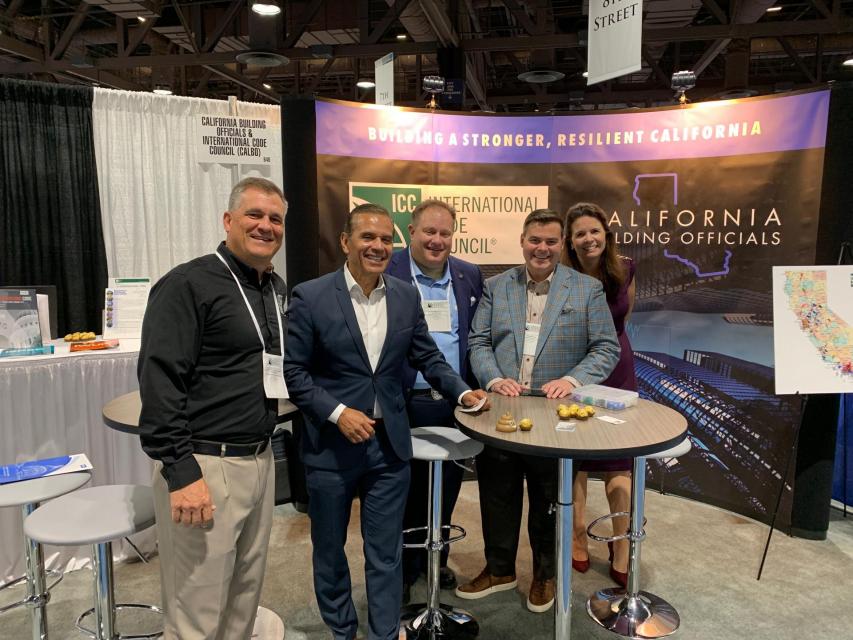 LONG BEACH – CALBO was proud to
partner with the International Code Council (ICC) at the League
of California Cities annual conference and expo, showcasing a
theme of seismic resiliency and local government
leadership. CALBO’s Executive Board and Staff joined ICC
Government Relations team-members Susan Dowty and Chris Ochoa for
the two-day conference held in Long Beach.
LONG BEACH – CALBO was proud to
partner with the International Code Council (ICC) at the League
of California Cities annual conference and expo, showcasing a
theme of seismic resiliency and local government
leadership. CALBO’s Executive Board and Staff joined ICC
Government Relations team-members Susan Dowty and Chris Ochoa for
the two-day conference held in Long Beach.
League attendees stopped by our booth and had the opportunity to browse the new California codes, in addition to sending personal notes to their building departments and pinning their jurisdiction on a California map. Former Los Angeles Mayor Antonio Villaraigosa (pictured) even visited for a bit discussing his involvement with a new regional transit project.
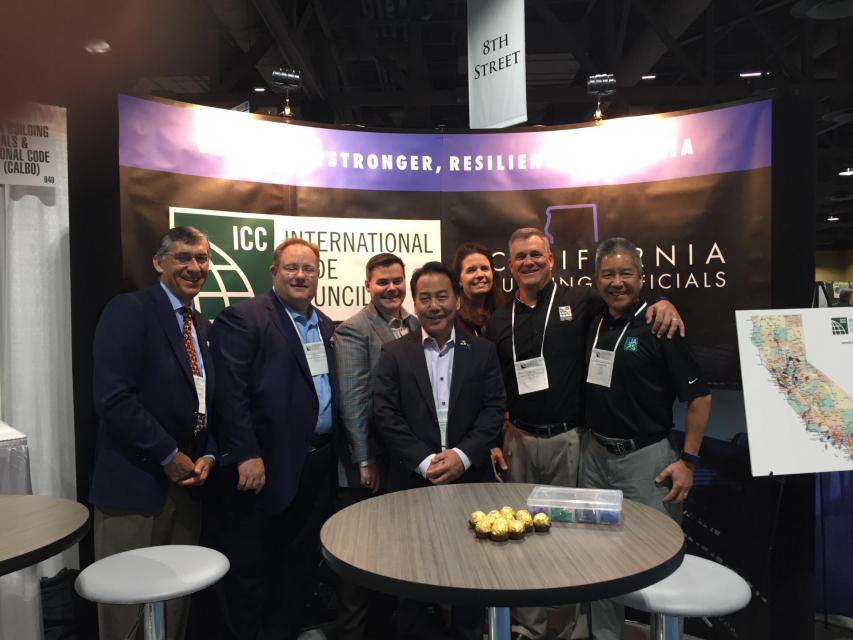 CALBO has been an exhibitor for
nearly 20 years at the League of California Cities in an effort
to build connectivity with senior city administration and
municipal decision makers. Partnering with ICC bolstered our
role and provided both organizations with an opportunity to talk
about code development, public safety, innovation, technology and
leadership in building departments. Additionally; both
organizations were able to highlight our efforts to boost seismic
resiliency efforts at local, state and international levels.
CALBO has been an exhibitor for
nearly 20 years at the League of California Cities in an effort
to build connectivity with senior city administration and
municipal decision makers. Partnering with ICC bolstered our
role and provided both organizations with an opportunity to talk
about code development, public safety, innovation, technology and
leadership in building departments. Additionally; both
organizations were able to highlight our efforts to boost seismic
resiliency efforts at local, state and international levels.
CALBO looks forward to partnering with ICC again for the 2020 League of California Cities annual conference and expo, to be held again in Long Beach October 7-8, 2020.
For any questions regarding the information provided above, please contact the CALBO Office.
Production Housing and the New Code: When to Require Plan Updates
 Implementation of the 2019 edition of
the California Building Codes (CBC) are upon
us. Building departments across California seem to
have differing opinions of when production model plans need to be
updated for the new code edition.
Implementation of the 2019 edition of
the California Building Codes (CBC) are upon
us. Building departments across California seem to
have differing opinions of when production model plans need to be
updated for the new code edition.
It is important to begin with what the law says about the effective date of the new codes. The California Health and Safety Code Section 18938.5 states the following:
“18938.5. (a) Only those building standards approved by the commission, and that are effective at the local level at the time an application for a building permitis submitted, shall apply to the plans and specifications for, and to the construction performed under, that building permit.”
So, what constitutes an “application for a building permit”? Some building departments believe that an application for production home plans for plan review is an application for a building permit. Therefore, the building code edition for all homes in the subdivision is locked in or vested at the time of this application. For example, if a production home plan was approved on 2018 or 2019, then all homes for this plan can be construction under the 2016 California Codes indefinitely until the subdivision is built out.
CALBO Education Week: Burlingame
Lunch and Learn with Energy Code Ace
FREE for ALL CALBO Education Week: Burlingame Attendees.
Limited seating – first-come, first served for this special opportunity!
 You’re invited to attend “Lunch and Learn,” a special lunch presentation on “Q&Ace: How to Ace Energy Code Questions.” Join us to learn how-to quickly and effectively respond to your customers’ top six most commonly asked energy code questions using Energy Code Acetools and resources. Additionally, we’ll discuss how to best prioritize time based on the requests that may yield the most energy savings.
You’re invited to attend “Lunch and Learn,” a special lunch presentation on “Q&Ace: How to Ace Energy Code Questions.” Join us to learn how-to quickly and effectively respond to your customers’ top six most commonly asked energy code questions using Energy Code Acetools and resources. Additionally, we’ll discuss how to best prioritize time based on the requests that may yield the most energy savings.
You’ve gained code knowledge in the classroom – now learn what freetools, training, and resources are available for you and your building department! All aimed to help decrease the amount of time currently spent explaining energy code requirements and forms to customers, reviewing plans and forms, and performing inspections.
Thank you Energy Code Ace for hosting the 2019 CALBO Education Weeks: Lunch and Learn Event in Newport Beach
A special thank you to Energy Code Ace for hosting the Lunch and Learn event at the 2019 CALBO Education Week: Newport Beach!
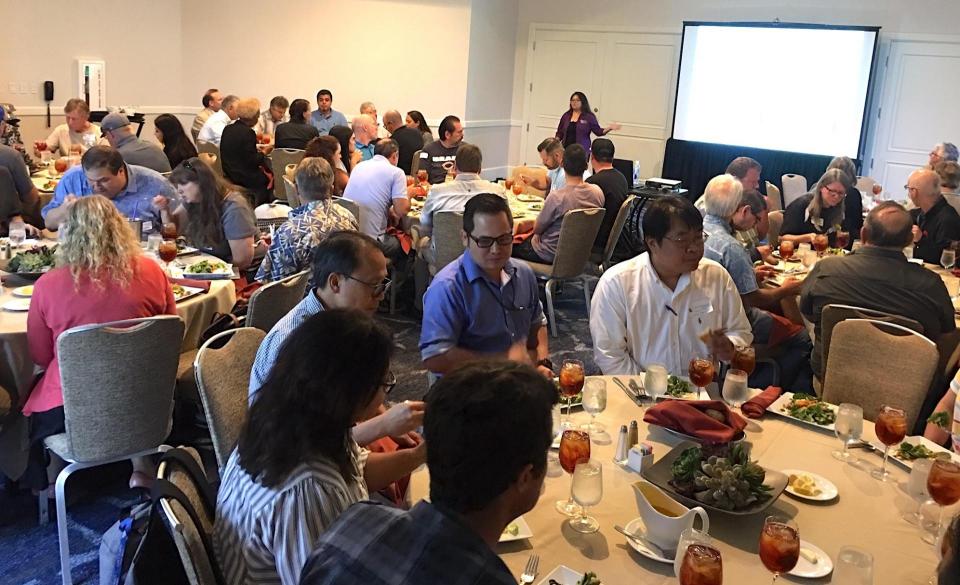 As a new training opportunity, the Lunch and Learn event offers industry leaders the opportunity to spotlight their knowledge and expertise of an important building-and-safety topic. As this event is offered during CALBO Education Weeks, attendees have the opportunity to take a break from their classes to eat lunch and learn up-to-date information on a topic that affects the future of our industry.
As a new training opportunity, the Lunch and Learn event offers industry leaders the opportunity to spotlight their knowledge and expertise of an important building-and-safety topic. As this event is offered during CALBO Education Weeks, attendees have the opportunity to take a break from their classes to eat lunch and learn up-to-date information on a topic that affects the future of our industry.
This year, Lunch and Learn attendees learn about how to quickly and effectively respond to customers’ most commonly asked energy code questions using Energy Code Ace tools and resources. Additionally, attendees learn how to best prioritize time with customers to yield the most energy savings.
Thank you to presenter Fiona Terreri with Energy Code Ace for her contributions and knowledge!
If you are attending the 2019 CALBO Education Week in Burlingame, don’t miss your opportunity to attend a Lunch and Learn event hosted by Energy Code Ace.
A Special Message from Your 2019-20 CALBO President
 Dear CALBO Friends and Colleagues,
Dear CALBO Friends and Colleagues,
It was a pleasure to see and meet many of you at recent CALBO training events. With the large attendance at the Newport Beach and San Ramon Education Weeks, and registrations coming in for the upcoming Ontario and Burlingame Education Weeks, it is clear that training and education is a top priority for building departments and industry professionals statewide. Code changes and code adoption will continue to be a significant part of our schedules in the next several months. Thank you to the entire membership – whether you are a course attendee, instructor, course developer, or you are performing the code adoption – for all of your commitments, which demonstrate our membership’s dedication to the profession.
As the first legislative session under Governor Newsom comes to a close, CALBO, along with many other organizations, are looking at which bills he signs into law to set his policies and priorities. The Governor has until October 13 to sign or veto bills passed by the legislature. This will help us prepare for the second year since many bills that CALBO monitored this year have become two-year bills. This year, CALBO’s legislative priorities focused on seismic resiliency, accessory dwelling units, and disaster recovery. Through the CALBO Board, membership, and staff’s active efforts with state legislators and partnership organizations, like the League of California Cities, CALBO’s positions centered on the impact on building departments that include code implementation, administration, staffing, and funding.
One of CALBO’s focus this year is the seismic inventory bill, AB 429, by Assembly Member Nazarian. After CALBO opposed the bill in 2018, which identified local funds as a possible funding source for the program, this year CALBO collaborated with the Assembly Member on a bill that would require the Seismic Safety Commission to identify funding (that may include state funds and federal grants) and develop a process for a third party to create an inventory of potentially seismically vulnerable buildings. The bill was also amended to apply only to the most seismically vulnerable counties. Since the bill was moved to the Inactive File, it is now a two-year bill and will continue to be a focus for CALBO in 2020.
The state legislature put forth numerous housing bills this year ranging from housing production to tenant protection; among the housing bills is SB 13 (Wieckowski), a bill on Accessory Dwelling Units. CALBO closely monitored this bill and actively engaged with the author’s office throughout the year to address our concerns. To read about the details of CALBO’s legislative advocacy, please see the thorough legislative update from Katie Almand, CALBO’s Director of Public Affairs, in this CALBO Newsletter.
Several exciting opportunities to advance and promote our building-safety profession are just around the corner. At the League of California Cities Annual Conference and Expo in Long Beach this month, CALBO and the International Code Council (ICC) are partnering to host a speaker series on seismic safety and resiliency at an expanded booth in the Expo Hall. Right after this League Expo is the ICC Annual Conference, Expo, and Code Hearings in Las Vegas. For the Code Hearings, given that there are many regional or local ICC Chapter code committees actively working on code development, CALBO has created a webpage to post the Chapter committees’ coordination of code change proposals. We hope this will provide a valuable tool for those attending the Code Hearings. With the shorter travel distance to the League of California Cities Annual Conference and ICC Annual Conference, I encourage CALBO membership to have a strong presence at these events.
With so many educational and conference events ahead of us, I am looking forward to seeing and catching up with many of our members. See you soon!
Sincerely,
Sharon Goei, P.E., C.B.O
Director of Building and Housing
City of Milpitas
A Brief Message from CALBO Training Institute Chair, Bob Latz
The new code books are available, and what better way to either find out what is new and changed or to revisit existing requirements than to attend the upcoming Education Weeks. We have another great year of training available this year as we prepare for another new code cycle. The CALBO Training Institute (CTI) has developed and prepared a variety of technically informative and interesting courses for your training needs. We are here to provide a year of valued educational experiences whether at the Education Weeks or through Independent Offerings across California. All courses have been created to provide practical applications and interpretations bringing California building departments the finest building-safety training available.
This year, CTI has been focused on bringing you the latest updates through code changes that will benefit both seasoned building-safety department personnel and newly recruited industry members. Please take the time to review the courses listed in the Annual Training Catalog to find what best suits your training needs. Each course listed provides a course title and description to help you select the courses you desire. If you have any questions regarding the Education Week curriculum, please do not hesitate to reach out to CALBO staff, myself or the CTI Commission.
With this being a code change year, CTI knows the importance of getting all of your staff members to the enriched training available. For the first time, CTI is hosting four Education Weeks: Newport Beach from August 26-29, San Ramon from September 9-12, Ontario from October 14-17, and Burlingame from December 16-19. Look for other optional training opportunities listed as Independent Offerings. CTI hopes that an expansion of Education Weeks and Independent Offerings provides flexibility for departments and industry companies to send their staff between venues allowing more time in the classroom throughout the entire year. Thank you for your support through attendance and feedback as we continue to expand valuable training opportunities.
CTI continues to be a leader in quality education as an International Code Council Preferred Provider. Each CTI course has been approved and can be used toward the CEU requirements for renewing your certifications.
I would personally like to thank you – CALBO members, consultants, and industry representatives for your support of all CTI endeavors, especially Education Weeks. Thank you to the CTI Commissioners, course developers and instructors who volunteer their time and expertise to create essential and meaningful programs. Without each of you, CTI would not be able to provide the premier quality education you deserve.
We look forward to seeing all of you as we come together for training and professional development this year!
Sincerely,
Bob Latz, C.B.O.
Regional Manager
CSG Consultants, Inc.
2019 CALBO Education Weeks: New Course Highlights
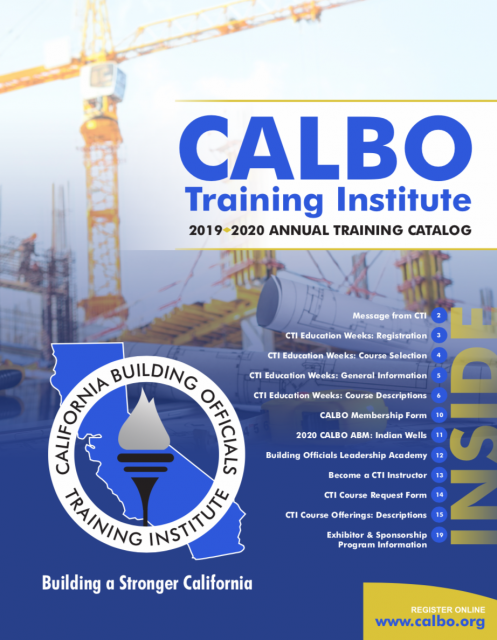 Did you know that there are almost twenty newly developed courses offered this year at CALBO Education Weeks? The CALBO Training Institute (CTI) Commissioners and CALBO staff have worked tirelessly to develop courses that are not only technically insightful and proficient, but provide real-life experiences that building-safety department staff can encounter on a day-to-day basis. It is CTI’s goal to furnish building departments staff with tools to keep active and up-to-date on code changes and amendments, new technology, and advanced thinking on issues related to our industry.
Did you know that there are almost twenty newly developed courses offered this year at CALBO Education Weeks? The CALBO Training Institute (CTI) Commissioners and CALBO staff have worked tirelessly to develop courses that are not only technically insightful and proficient, but provide real-life experiences that building-safety department staff can encounter on a day-to-day basis. It is CTI’s goal to furnish building departments staff with tools to keep active and up-to-date on code changes and amendments, new technology, and advanced thinking on issues related to our industry.
Some of the new courses offered this year are:
- 2019 California Energy Code: Nonresidential Submittal Requirements (Half Day)
- 2019 California Energy Code: Residential Submittal Requirements (Half Day)
- 2019 California Nonresidential and Residential Energy Standards: Overview
- 2019 CBC Chapter 11B: Accessibility in Public Buildings, Public Accommodations, Commercial Buildings and Public Housing
- 2019 California Electrical Code: Overview
- 2019 Means of Egress: Overview
- Accessory Structures, Decks, Carports and Patio Covers
- An In Depth Review of Residential Fire Sprinkler Systems and Overview of Commercial Hood Suppression System
- Applying Accessibility Requirements to Alterations
- From Model Code to California Code Amendments and Adoption: The Code Development Process Explained
- Housing A to Z: Overview of Various Types of Accessible Housing
- Inspection for Solar Photovoltaic and Energy Storage Systems
- Plan Check for Solar Photovoltaic and Energy Storage Systems
- Plan Review of Residential Additions
- Simplified Structural Plan Review
- The Essentials for Permit Technicians
- Understanding Access Law in California: Accessibility, Statutory Case Law and Code Enforcement for Existing Public Accommodations
CALBO Education Weeks: Newport Beach & Burlingame
Lunch and Learn with Energy Code Ace
FREE for ALL CALBO Education Week: Newport Beach and Burlingame Attendees
Limited Seating – First-come, first served for this special opportunity!
 You’re invited to attend “Lunch and Learn,” a special lunch presentation on “Q&Ace: How to Ace Energy Code Questions.” Join us to learn how-to quickly and effectively respond to your customers’ top six most commonly asked energy code questions using Energy Code Acetools and resources. Additionally, we’ll discuss how to best prioritize time based on which requests may yield the most energy savings.
You’re invited to attend “Lunch and Learn,” a special lunch presentation on “Q&Ace: How to Ace Energy Code Questions.” Join us to learn how-to quickly and effectively respond to your customers’ top six most commonly asked energy code questions using Energy Code Acetools and resources. Additionally, we’ll discuss how to best prioritize time based on which requests may yield the most energy savings.
You’ve gained code knowledge in the classroom – now learn what freetools, training, and resources are available for you and your building department! All aimed to help decrease the amount of time currently spent explaining energy code requirements and forms to customers, reviewing plans and forms, and performing inspections.
Implementation of Cloud-Based Permit System – City of Stockton Experience
Written By: John Schweigerdt, City of Stockton - CALBO Innovative Practices Committee
Introduction
 As government entities continue to try
and provide more services with less resources, they may look
toward technology improvements to increase efficiency and
streamline services. One of the many government software
solutions that may require updating is the permitting system used
for development services permits such as building, planning, and
engineering permits. While there are a variety of different
systems available, there are generally two different types;
cloud-based systems and in-house or “self-hosted” systems. This
paper will outline the experience the City of Stockton had with
implementing a cloud-based permitting system.
As government entities continue to try
and provide more services with less resources, they may look
toward technology improvements to increase efficiency and
streamline services. One of the many government software
solutions that may require updating is the permitting system used
for development services permits such as building, planning, and
engineering permits. While there are a variety of different
systems available, there are generally two different types;
cloud-based systems and in-house or “self-hosted” systems. This
paper will outline the experience the City of Stockton had with
implementing a cloud-based permitting system.

